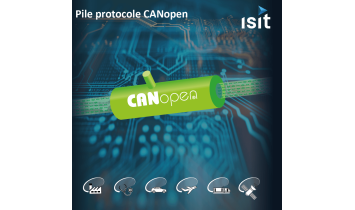
ISIT J1939 Stack
- Domains : Transportation , Machines , Agricultural & forestry
- Protocols : J1939
- Products / Services : Software
- Provider : ISIT
ISIT provides a software-based J1939 protocol stack fully compliant with the SAE J1939 standard.
J1939 protocol
The SAE J1939 protocol is widely used in industries that rely on engine- and equipment-based communications, including heavy-duty and utility vehicles, agriculture and forestry machinery, marine systems, military applications, and energy production equipment.
Built on the CAN ISO 11898-1/2 standard as lower layers, J1939 enables Electronic Control Units (ECUs) within a network to communicate through standardized messages, ensuring interoperability and reliable data exchange.
Built on the CAN ISO 11898-1/2 standard as lower layers, J1939 enables Electronic Control Units (ECUs) within a network to communicate through standardized messages, ensuring interoperability and reliable data exchange.
ISIT J1939 protocol Stack
The ISIT J1939 stack is available in both single-channel and multi-channel CAN versions, supporting the implementation of multiple Application Controllers (ACs) on a single ECU.
Thanks to its modular architecture, the stack can be tailored to specific requirements in terms of CPU, memory, number of messages (PGNs), CAN networks, and additional supported protocols. It also integrates seamlessly with extended protocols such as:
- Transport Protocols (ISO-TP)
- Diagnostics (DiagOnCAN, UDS)
- Proprietary extensions
ISIT J1939 protocol Stack - Features and Benefits
- Full support for Address Claiming and NAME management
- Integrated Transport Protocols (BAM, P2P)
- Supports periodic and event-driven PGN transmission/reception
- Multi-channel CAN support
- Multiple Application Controllers per ECU
- Openness to parallel protocols (ISO-TP, UDS, DiagOnCAN, proprietary)
- Includes Stack Configuration Editor (with Source code generator).
- Additional Services:
- Development support and integration assistance
- J1939 protocol training for teams and developers




